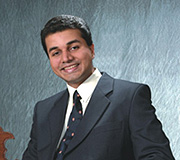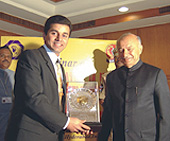|
Doctor Domuch
With his generosity, many qualifications, commitment to social needs, multiple scholarships and awards, and excellent academic credentials, Koshy Eapen is a model for young people, especially those linked to the medical fraternity
Empire Bureau
|

|
|
|
| There are nearly 150,000 students at the University of London. One is singled out each year for being particularly brainy and go-getting. In 2004, the honour went to a young Indian doctor, Koshy Eapen, who took an MSc in epidemiology at the London School of Hygiene and Tropical Medicine (one of the university’s 30 colleges).
Before joining the University of London, Eapen was at the University of Cambridge. He was the first Indian doctor to be awarded the full Cambridge Commonwealth Scholarship for his studies on the health care of the elderly. Previous winners included former US President J.F. Kennedy, former US secretary of state Henry Kissinger, rock star Elvis Persley, software expert Linus Torvalds, management guru Anthony Robbinsactor, action star Jackie Chan and Sri Lankan cricketer Arjuna Ranatunga.
He has been conferred the “Pride of India” (Bharat Gaurav) Award by India International Friendship Society on the sidelines of the international conference of overseas Indians at the Pravasi Bharatiya Divas 2006 in Hyderabad. These awards are for eminent Indians anywhere in the world for excellence in the fields of science, technology, education, industry, arts, politics or social services. Former recipients of the award have included Swaraj Paul, vice-president B.D. Jatti, Navneet Dholakia, Adam Patel, S.S. Ramphal, British high commissioner to India Michael Arthur, Mother Teresa, industrialist Vijay Mallya, film stars Dev Anand, Sunil Dutt and Rajesh Khanna and cricketer Sunil
Gavaskar. |
|

|
DOCTOR FEEL
GOOD
Koshy Eapen receives the Pride of India Award 2006 from Sushil Kumar Shinde
|
|
| So now you get a picture of how specially gifted this doc is. Which bring us to the question: what fires him up? Eapen is passionate about caring for the elderly and he wants to alleviate the pain of those in their sunset years. “There is no need for the elderly to suffer as they do now. There are simple, cost-effective ways of managing most of their illnesses,” says Eapen, currently a medical researcher on the epidemiology of geriatric care at the University of London.
His research focuses on how India can emulate the developed countries in taking care of the aged at a low cost by properly using available resources. He aims to help India develop a comprehensive, cost-effective health policy for the aged. His primary work is to develop health-care systems for the elderly who constitute over 12 per cent of the population in India.
Eapen has also financially contributed to the cause of medical studies in India. He recently set up a charitable trust in Kerala to fund fully the medical education of 50 needy students. He hopes these scholarships will encourage students to work in areas where India lacks expertise.
Which is why all those accolades come pouring in. Says Eapen about the award, which he shares with Queen Rania Al Abdullah II of Jordan, “I am certainly thrilled to win such a prestigious award. I have committed this prize money to the educational trust I founded in India to offer further full scholarships for Indian students.” A Cambridge-Nehru scholar, also he won the prestigious Harrison Watson and the Cambridge Commonwealth/JNMT scholarships. He also won awards that enabled him to visit and research at the National Institute of Health at Johns Hopkins University and the University of North Carolina in the US, and Erasmus University, Holland.
After a fellowship in clinical training in Oxford, Eapen joined the University of London where he is now on a Mountbatten Scholarship. Eapen says there is a catastrophe waiting to happen in India, because it has one of the largest aging populations in the world but almost no specialist services for the elderly. “There is no central geriatric healthcare policy, very little medical insurance cover available for the old, and hospices are virtually non-existent,” he says. ”
So what’s it about the many different qualifications? Well, he says when he graduated in India he sensed no adventure in following the expected career trajectory. After house jobs he started a rural job, in which he was fascinated by the elderly patients. “They came to hospital for a variety of reasons, only one of them being illness,” says Eapen. “I felt a new initiative had to come from the government, so I became interested in geriatric health policy. With no other avenue to pursue health policy, I took an MBA programme, followed by a degree in creative writing.” If ever there’s a man of may parts, Eapen’s the man. |
|
|
|
|
|
March 2006
|
|

|
|
|
|